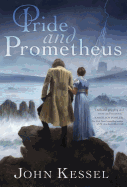
Mary Shelley's Frankenstein is 200 years old, and countless film adaptations have whittled it into a story we feel we all know. So, too, with Pride and Prejudice, published only five years earlier. But in fallow corners of these novels, John Kessel has found old parts and made them into something electrifyingly new.
It's been 13 years since Elizabeth married Darcy. Pompous and uncouth middle Bennet sister Mary has met her dwindling marital prospects with resignation, and a late--and incomplete--self-awareness. Taken for granted at home, she goes with younger sister Kitty to Pemberley to visit the Darcys. There Mary is smitten by another houseguest, the brooding Swiss scientist Victor Frankenstein.
Frankenstein is aloof, which makes sense: he's fleeing a creature who threatens his destruction if he doesn't create a mate for him. And that creature has followed him to England. But Mary sees in Victor a kindred spirit, a man of learning who doesn't laugh at her intellect. It doesn't matter that he's obsessive, emotionally unavailable and of dubious ethics.
This mismatch alone makes for a gleefully brisk and witty plot. But Kessel, ever probing issues of gender norms and humanism, strikes an even deeper vein. When Mary confronts the creature in a tavern, he tells her of Victor's plans "to make me happy." But Mary, who has seen her share of mismatched partners, retorts, "You put too much on having a mate." Kessel's Pride and Prometheus blasts away the pretense and self-pity of the misunderstood monster. --Zak Nelson, events and marketing manager, Third Place Books, Seattle, Wash.

